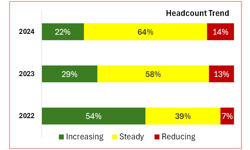
By focussing research on finding answers to such questions, this unique approach will speed discovery by fostering collaboration and knowledge sharing between subject communities, says Cambridge University Press. It will also provide opportunities to publish research from areas that are not well served by traditional, discipline-specific journals.
Informed by feedback from hundreds of researchers, the first titles under the Research Directions banner will launch in 2022, with an initial set of questions and a publishing model that mirrors the research lifecycle, with results, analysis and impact reviews all published as separate, Open Access, peer-reviewed and citable outputs on the Press’s Cambridge Core platform.
In contrast, says Cambridge University Press, to the traditional, self-contained research paper, researchers will be able to contribute at different stages in the process, sharing and building on each other’s work. They can submit results that address the questions posed, or analysis of others’ results, offering alternative insights and interpretations and using the findings to inform their own work. As the final part of the process, review articles will bring together the work done in response to particular questions, describing the context and the impact of what has been published.
After the initial launch of each journal, its future questions will be shaped within the research community, with proposals debated and refined before they are formally posed by the journals’ editorial boards.
At each stage, contributors will also be able to link research published on Cambridge Core to preprints, data, conference presentations and other supporting material that they post on the Press’s early research platform, Cambridge Open Engage, improving transparency and the reproducibility of results.
Cambridge Open Engage will further complement the formal publication of research on Cambridge Core by providing a space for discussion and feedback, helping authors refine their work and allowing wider input from the research community.

Research Directions is the brainchild of Fiona Hutton, Executive Publisher at the Press and its Head of STM Open Access Publishing. A former research scientist, she wants to provide alternatives to traditional journal formats and bring communities together to frame research to problems that no one discipline would be able to tackle alone.
She said: “There is a revolution under way in scholarly publishing, with major innovation and a disruption of the traditional forms that have become a source of frustration for some researchers.
“Research Directions disrupts traditional journal publication to better reflect the research lifecycle, while attracting researchers and authors to pose and address the big questions in their field. It puts the emphasis firmly back on the research, and provides space for discovery and collaboration in ways limited by traditional research papers.
“Where before you would have had a series of very static, traditional journals, you will now have living communities of researchers, working together, sharing and learning from each other’s findings to answer questions that they themselves have helped to shape.”
She added: “At the same time, we retain the benefits of rigorous and open peer review alongside the quality assurance and support that comes from publishing with Cambridge.
“As a university press, we see open research as fundamental to our mission to advance learning, research and knowledge worldwide. We have embraced the drive for open research, combined with freedom from the constraints of print, as an opportunity to experiment and innovate; to offer different solutions, to further the transition to a diverse, open future, and to work with our academic communities to facilitate outstanding research.”
Keep up-to-date with publishing news: sign up here for InPubWeekly, our free weekly e-newsletter.










